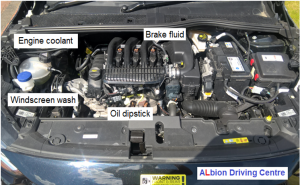The Show me, tell me questions
The Show me / Tell me safety check questions and answers can be found here. More details can be found in the DVSA publications Driving the Essential Skills and The Official DVSA Driving Tests. More DVSA books can be found at-
https://www.dvsabooks.com/index.php?main_page=index
More advice and information can also be found in your manufacturer’s handbook.
One question from the tell me list will be used at the beginning of the test and before leaving the car park. The other one will be from the show me list and asked driving along.
The show me questions-
When it’s safe to do so…
- Show me how you wash and clean the rear windscreen
- Show me how you wash and clean the front windscreen
- Show me how you switch on your dipped headlights
- Show me how you’d set the rear demister
- Show me how you’d operate the horn
- Show me how you’d demist the front windscreen
- How do you open and close the side window?
The Tell me questions-
Brakes should not feel spongy or slack. They should be tested as you set off. The vehicle should not pull to one side.
Tyre pressures can be found in the manufacturers handbook. Use a reliable gauge to check and adjust the pressures. Check them when they’re cold, and don’t forget the spare. Remember to refit the valve caps.
The head restraint should be adjusted so the level is at least as high as the eyes and ears, and as close to the back of the head as is comfortable. Note: Some might not be adjustable.
There should be no lumps, bumps, cuts, cracks and bulges in the side walls. There should be a minimum of 1.6mm depth of tread across the centre three-quarters breadth and around the circumference of the tyre.
Explain how to operate the switch (turn on the ignition if necessary). Walk around the vehicle if required. You shouldn’t need to.
The warning light on the dashboard should illuminate.
Explain that you’d switch on the hazard warning lights. Walk around the car to check, if necessary.
Brake lights
Check that the handbrake is on and the gear is in neutral. Turn on the ignition, but not the engine. Apply the footbrake and make use of garage doors, windows etc. for any reflections. Ask someone to help if it’s possible. You shouldn’t need to check the brake lights physically.
If the steering becomes heavy the system may not be working properly. Drive forwards and turn the steering wheel. It should turn noticeably with you and shouldn’t feel heavy.
Fog lights
Check that the handbrake is on and the gear is in neutral. Turn on the ignition until the lights come on the dashboard. Turn on the dipped headlights, then turn on the rear fog lights. Check the rear fog light’s orange warning light is illuminated on the dashboard. Fog lights should only be used when visibility is less than 100 metres.
Check that the handbrake is on and the gear is in neutral. Turn the ignition until lights come on the dashboard, but don’t start the engine. Turn on the head lights. Switch to main beam. Check that the blue main beam warning light on the dashboard is illuminated.
The engine oil dipstick
Open the bonnet and identify the oil dipstick. Explain how to remove the dipstick, wipe it clean and replace it. Then describe how to remove it to check the oil level is in-between the minimum and maximum markers.
Coolant
Identify the high and low level markings on the header tank where fitted, or the radiator cap. Describe how to top up to the correct level with water and anti-freeze.
Brake fluid
Open the bonnet and identify the brake fluid reservoir. Explain how to check the level between minimum and maximum markers.
The Show me / Tell me questions are current from May 2021



